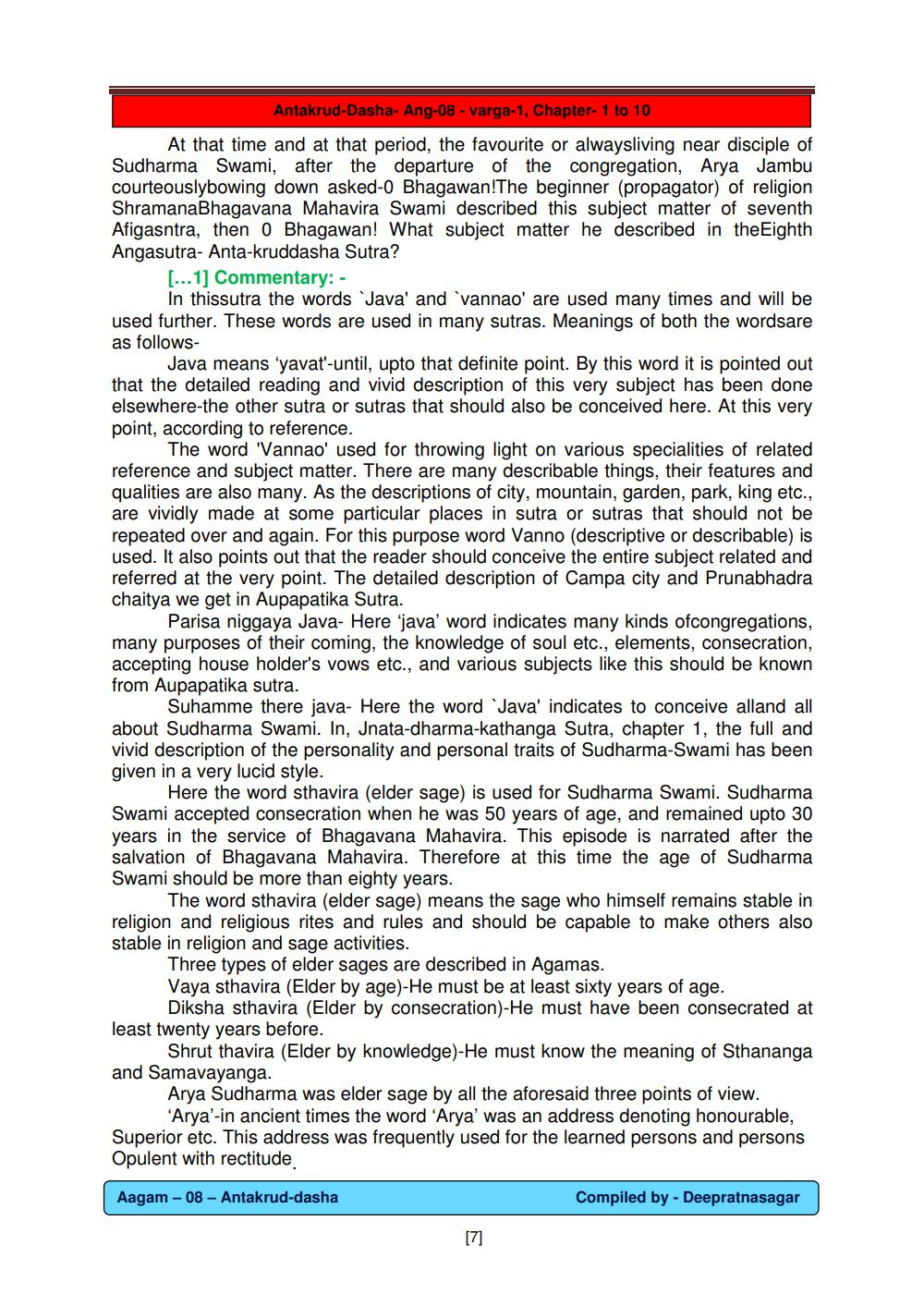________________
Antakrud-Dasha-Ang-08 - varga-1, Chapter 1 to 10
At that time and at that period, the favourite or alwaysliving near disciple of Sudharma Swami, after the departure of the congregation, Arya Jambu courteouslybowing down asked-0 Bhagawan!The beginner (propagator) of religion ShramanaBhagavana Mahavira Swami described this subject matter of seventh Afigasntra, then 0 Bhagawan! What subject matter he described in the Eighth Angasutra- Anta-kruddasha Sutra?
[... 1] Commentary: -
In thissutra the words 'Java' and `vannao' are used many times and will be used further. These words are used in many sutras. Meanings of both the wordsare as follows
Java means 'yavat'-until, upto that definite point. By this word it is pointed out that the detailed reading and vivid description of this very subject has been done elsewhere-the other sutra or sutras that should also be conceived here. At this very point, according to reference.
The word 'Vannao' used for throwing light on various specialities of related reference and subject matter. There are many describable things, their features and qualities are also many. As the descriptions of city, mountain, garden, park, king etc., are vividly made at some particular places in sutra or sutras that should not be repeated over and again. For this purpose word Vanno (descriptive or describable) is used. It also points out that the reader should conceive the entire subject related and referred at the very point. The detailed description of Campa city and Prunabhadra chaitya we get in Aupapatika Sutra.
Parisa niggaya Java- Here 'java' word indicates many kinds ofcongregations, many purposes of their coming, the knowledge of soul etc., elements, consecration, accepting house holder's vows etc., and various subjects like this should be known from Aupapatika sutra.
Suhamme there java- Here the word Java' indicates to conceive alland all about Sudharma Swami. In, Jnata-dharma-kathanga Sutra, chapter 1, the full and vivid description of the personality and personal traits of Sudharma-Swami has been given in a very lucid style.
Here the word sthavira (elder sage) is used for Sudharma Swami. Sudharma Swami accepted consecration when he was 50 years of age, and remained upto 30 years in the service of Bhagavana Mahavira. This episode is narrated after the salvation of Bhagavana Mahavira. Therefore at this time the age of Sudharma Swami should be more than eighty years.
The word sthavira (elder sage) means the sage who himself remains stable in religion and religious rites and rules and should be capable to make others also stable in religion and sage activities.
Three types of elder sages are described in Agamas. Vaya sthavira (Elder by age)-He must be at least sixty years of age.
Diksha sthavira (Elder by consecration)-He must have been consecrated at least twenty years before.
Shrut thavira (Elder by knowledge)-He must know the meaning of Sthananga and Samavayanga.
Arya Sudharma was elder sage by all the aforesaid three points of view.
'Arya'-in ancient times the word 'Arya' was an address denoting honourable, Superior etc. This address was frequently used for the learned persons and persons Opulent with rectitude
Aagam - 08 - Antakrud-dasha
Compiled by - Deepratnasagar




